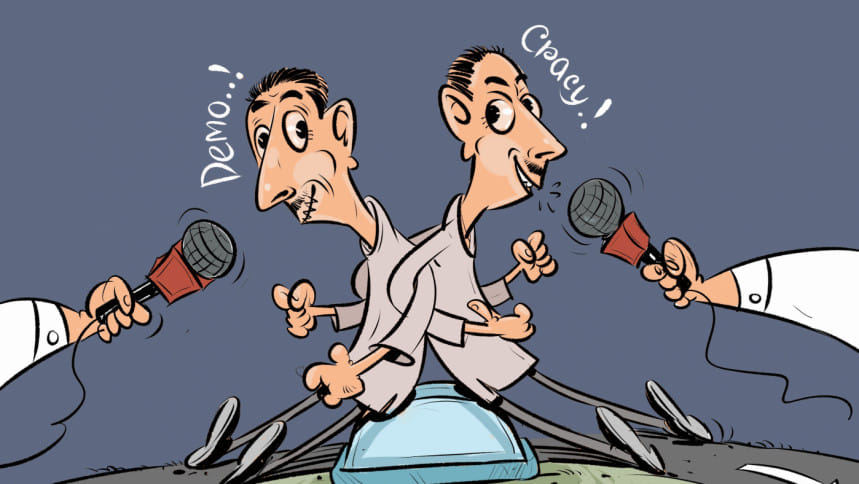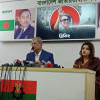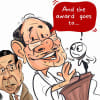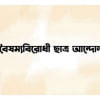The AL cannot validate this farce of an election with intimidation

What is happening in the name of a general election on January 7 is, in reality, an attempt to take away people's voting rights. In a real election, all contestants can take part freely, and voters have several options to choose from to be their representatives. As we can see, voters won't really have many choices on January 7. The Awami League has put up its own candidates as its "rival" contestants. Its allies did not have confidence in this "rivalry"; hence, they sought assurance on seat-sharing beforehand, and the ruling party came to an understanding with the allies in this regard. Besides, unofficial arrangements are being made to ensure seats for some.
In the rest of the seats where the ruling party is claiming to have the so-called "contest," the main Awami League candidates are competing against dummy or "independent" candidates put up by the party to make the election look free and fair. When this is the situation, this election cannot be considered a proper one. We think the people of the country have rejected this election seeing it for what it really is: a farce.
Though the ruling party has been claiming to want a participatory election, they have created such a situation—cracking down on opposition parties and arresting their leaders—that there is little scope for the main opposition to enter the race. Many political parties, including Ganosamhati Andolan, have been claiming for a long time that a free and fair election is not possible under a partisan government. This has always been the case, and it was the Awami League which, as the party in opposition, waged a movement to establish a neutral caretaker government system.
However, the caretaker government system had some practical flaws. The Awami League accused BNP of trying to influence the caretaker government as well. Hence, a proposition to amend these flaws was raised, and even Awami League's parliamentary committee tabled some proposals to that end. But when it came back to power, it opted to scrap the caretaker government system altogether through the 15th Amendment of the constitution and made elections under the partisan government constitutional in 2011.
Since then, the ruling party has been parroting that the election must be held in accordance with the constitution. We have witnessed two general elections under the Awami League government: In 2014, we saw an election where half the seats were won uncontested, and in 2018, ballot stuffing happened the night before election day. These two elections proved without a shred of doubt that a free and fair election is not possible under a partisan government. So the main opposition has, quite logically, raised their demand for a caretaker government system to be framed in the constitution. And this demand is based on political consensus.
The Awami League could have done it if it wanted to. But instead, they snuffed out any possibilities of a dialogue. And using the planned violence at the BNP rally October 28, they cracked down on the BNP members.
So the main opposition's decision to boycott the January 7 election can be considered fair. They are also urging ordinary people to boycott the election. This appeal is getting significant positive response from the people, and the government knows that.
If you look at the history of parliamentary elections in the country, it is evident how enthusiastic Bangladeshis are about exercising their voting rights. For instance, the participation of voters in the 1991 election was 58 percent, 74-75 percent in 1996, 75-76 percent in 2001, and almost 86 percent in 2008. This time, however, the Awami League government is holding an election where they themselves are saying that the main challenge is to bring voters to the polling centres.
Since voters are reluctant to take part in this election, the ruling party has resorted to intimidation tactics, such as taking away VGF, elderly allowance, widow allowance, etc cards from social safety net beneficiaries, holding the cards until after the election, telling the voters they could get their cards back after they vote on January 7. In some cases, we have seen how supporters of the main opposition are being threatened to go to the polling booths, threatening to withhold important public services like birth registration, character certificate issuance, etc if they don't. Such threats violate people's freedom of choosing to vote. This is how the ruling regime is trying to validate this farce of an election.
It may seem too late to state this now, but we believe that it is still possible to hold a participatory election by disbanding the parliament—the constitution allows a 90-day period to hold a national election following the disbandment of a parliament. During this period, the authorities can engage with the main opposition to resolve this political crisis. We urge all relevant authorities to take this route.
Translated from Bangla by Sumaiya Binte Shams.
Zonayed Saki is chief coordinator of Ganosamhati Andolan.
Views expressed in this article are the author's own.
Follow The Daily Star Opinion on Facebook for the latest opinions, commentaries and analyses by experts and professionals. To contribute your article or letter to The Daily Star Opinion, see our guidelines for submission.

 For all latest news, follow The Daily Star's Google News channel.
For all latest news, follow The Daily Star's Google News channel. 











Comments